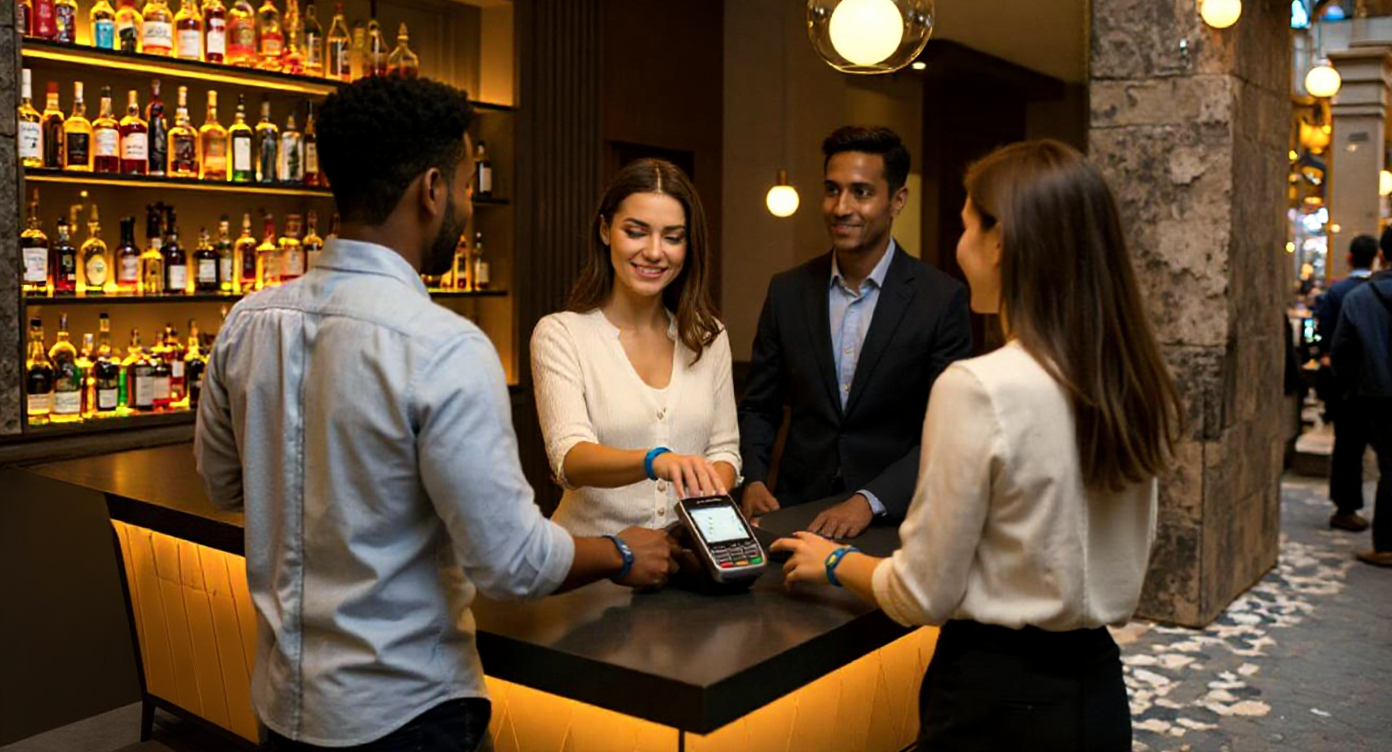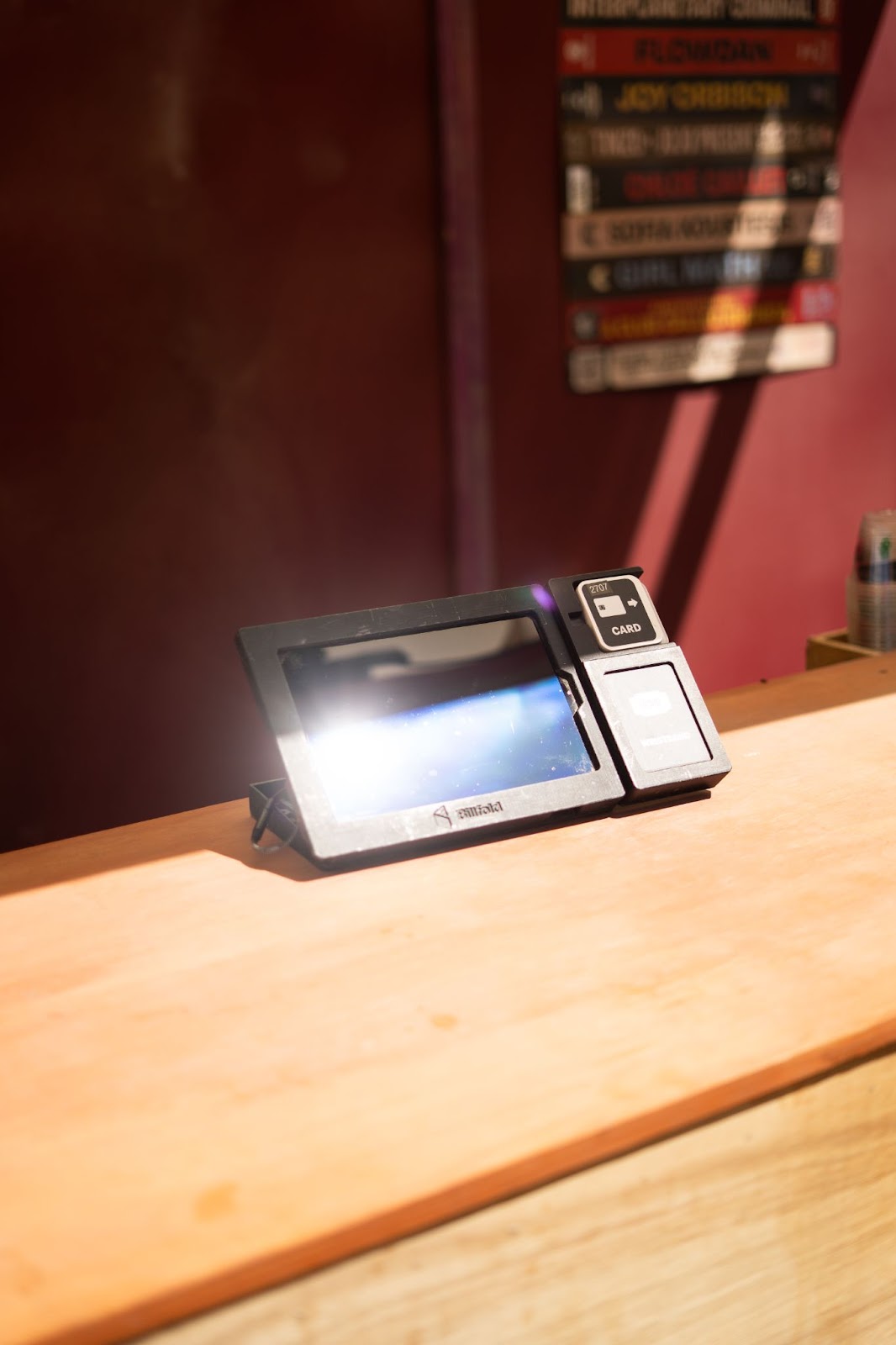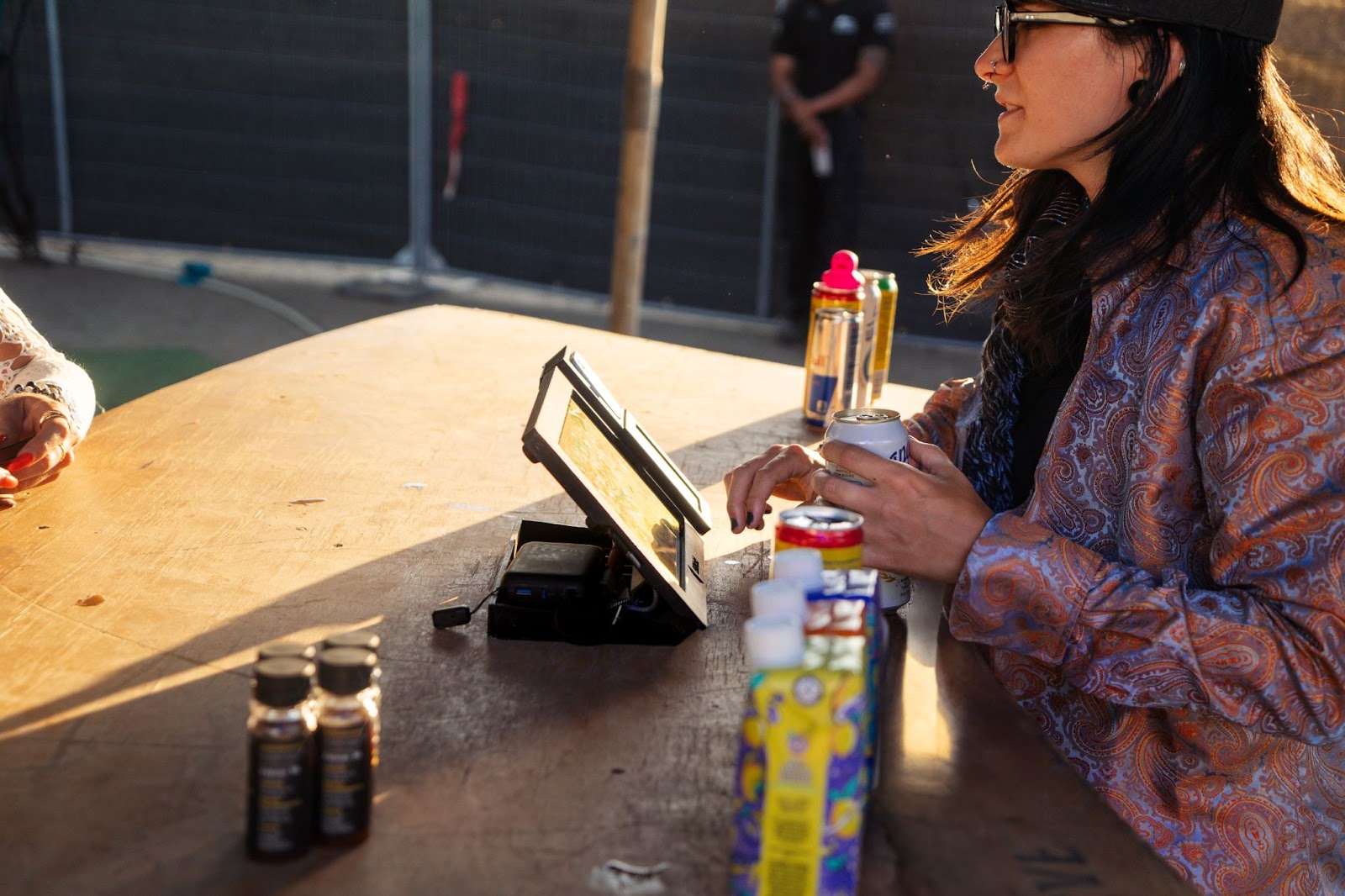How RFID Payments Are Transforming the Hospitality Industry: From Cruise Ships to Resort Experiences

The hospitality industry is experiencing a fundamental payment transformation as properties implement RFID payment systems at unprecedented scale. This adoption is driven by evolving guest expectations and documented operational benefits that deliver measurable return on investment across multiple performance metrics.
RFID payment technology has transitioned from emerging innovation to operational standard, with properties lacking these capabilities experiencing competitive disadvantage in guest satisfaction and operational efficiency.
Picture this: you're on a cruise ship, and instead of fumbling around for your wallet every time you want a drink, you just tap your wristband and the transaction is done. Or you're at a swanky resort where your room key also handles all your poolside purchases without missing a beat. This technology-driven convenience represents the current reality of RFID payment systems that are fundamentally transforming hospitality operations and guest experiences across the industry.
As contactless technology becomes the new standard in hospitality, with contactless transactions projected to reach $10 trillion by 2027, today's venues are discovering that RFID implementations create integrated ecosystems that enhance every aspect of the guest experience while delivering measurable business results.
What Makes RFID Payment Systems So Perfect for Hospitality?
RFID payment system technology operates through sophisticated radio frequency identification protocols that enable contactless transactions without physical contact or PIN entry requirements. The system comprises three essential components: RFID tags embedded within cards or wearable devices, readers that emit radio waves to activate these tags, and backend systems that process encrypted payment data within milliseconds.
RFID technology's versatility makes it particularly valuable for hospitality environments, as these systems can simultaneously manage multiple functions that traditional payment methods handle separately. A single RFID device can process payments, control room access, manage loyalty program integration, and enable location-based services throughout the property.
The system operates at 13.56 MHz frequency, providing an optimal balance between robust security protocols and operational convenience. The electromagnetic induction process activates passive RFID tags with sufficient energy to transmit encrypted payment information, completing transactions in under two seconds while maintaining enterprise-level security standards.

How Are Leading Hospitality Companies Successfully Implementing RFID?
Cruise Lines Are Leading the Pack
The cruise industry has emerged as a leading innovator in RFID payment technology, with major cruise lines implementing comprehensive systems that demonstrate the technology's full potential. Royal Caribbean's deployment on the Quantum of the Seas represents one of the most extensive RFID implementations in the hospitality sector.
Passengers receive "WOWband" wristbands equipped with 13.56 MHz NXP Semiconductors Mifare Ultralight C RFID chips. These devices enable guests to unlock staterooms, make bar and restaurant purchases, access exclusive lounges, and track luggage through the Royal iQ app.
Royal Caribbean has expanded RFID technology across multiple ships including Symphony of the Seas, with strategic plans for continued fleet-wide implementation demonstrating substantial investment in guest technology enhancement.
Disney Cruise Line has enhanced the guest experience through their DisneyBand+ system, which offers approximately 50 design options to accommodate diverse guest preferences. The system's most significant advantage lies in its cross-platform compatibility throughout Disney's resort ecosystem, enabling guests to use the same device across cruise and theme park environments.
Hotels and Resorts Getting in on the Action
Major hotel chains aren't sitting on the sidelines. With 72% of hotels having implemented or upgraded contactless payment solutions, they're implementing RFID payment systems that significantly enhance guest experiences while reducing operational costs. Implementation typically focuses on three key areas: room access, on-property purchases, and amenity control.
All-inclusive resorts have identified significant value in RFID implementations that eliminate the need for guests to carry cash, credit cards, or traditional room keys during their stay. This approach enables complete freedom of movement throughout resort properties, with guest satisfaction metrics showing substantial improvement when payment and access concerns are removed from the vacation experience.
Here's a smart move some resorts are making: RFID-tagged reusable cups that let staff track usage patterns, optimize service schedules, and promote sustainability by cutting down on single-use waste. It's good for business and good for the planet.

What Are the Key Benefits of RFID Payment Systems in Hospitality?
1. Speed That Is Rapid & Reliable
RFID transactions complete in under two seconds compared to 15-30 seconds required for traditional card processing. While this time difference may appear minimal, the cumulative impact becomes significant in high-volume environments such as resort bars, cruise ship dining venues, and hotel retail locations. This efficiency improvement substantially reduces guest wait times and enhances overall satisfaction during peak service periods.
2. Security That Actually Works
Each RFID transaction creates unique encryption codes and dynamic authentication, which basically means that even if someone somehow intercepted your transaction data, it'd be completely useless to them. Plus, since everything's contactless, there's zero risk of card skimming or PIN theft. Your payment info gets tokenized so the sensitive stuff never exists in a vulnerable state.
3. Loyalty Programs That Actually Feel Rewarding
RFID systems demonstrate sophisticated integration capabilities by automatically connecting payment transactions to guest profiles, enabling seamless loyalty point accumulation, personalized offers, and targeted promotions without requiring additional guest interaction. Properties can analyze spending patterns across all venues to develop customized experiences that enhance guest satisfaction and drive repeat visitation.
4. Operations That Run Like Clockwork
By automating cash handling, accelerating transaction processing, and virtually eliminating payment errors, RFID systems substantially reduce operational costs. Properties are reporting substantial labor savings on payment-related tasks, plus way fewer accounting headaches thanks to improved transaction accuracy.
5. Data Insights That Drive Real Results
RFID gives properties incredible visibility into guest spending patterns, busy times, and venue performance. This intel enables dynamic pricing, targeted promotions, and operational tweaks that maximize revenue per guest while making service delivery even better.

What Challenges Should You Expect When Implementing RFID Payment Systems?
Privacy is the big elephant in the room. Some guests get a bit nervous about location tracking capabilities, which is totally understandable. The key is being super transparent about privacy policies and giving people easy opt-out options while explaining how RFID is actually way more secure than traditional payment methods.
Infrastructure can be a real investment, especially if you're dealing with an older property that needs electrical and network upgrades to handle a comprehensive RFID system. The smart move? Roll things out in phases so you can test everything and train your team before going full throttle.
And speaking of training, this is huge. Your staff needs to understand both how the tech works and how to help guests who might be seeing this for the first time. Properties that invest in solid training programs see way higher adoption rates and way fewer "why isn't this working?" moments.
What Does the Future Hold for RFID Technology in Hospitality?
The evolution of RFID payment systems is moving fast, and the next wave of tech is going to be pretty mind-blowing. AI integration is enabling predictive analytics that can actually anticipate what guests want and automatically adjust services before they even ask. Imagine your room knowing you prefer it cooler in the evening and adjusting the temperature before you get back from dinner.
Mobile device integration continues to expand rapidly, with numerous properties implementing NFC-enabled smartphone capabilities as alternatives to physical RFID cards or wristbands. This approach provides guests with flexible payment options while maintaining consistent user experience across all touchpoints within the property.
Advanced biometric integration represents the next technological frontier, with select properties currently testing fingerprint and facial recognition systems that could eventually eliminate physical payment devices entirely. While still in early development phases, these technologies promise to deliver completely frictionless payment experiences for hospitality guests.
The trend toward contactless solutions in hospitality isn't slowing down anytime soon. Properties are starting to see RFID implementations as essential infrastructure rather than nice-to-have upgrades. The competitive advantage from seamless payment experiences is becoming a major factor in guest satisfaction and whether people come back.
FAQ
What types of hospitality venues benefit most from RFID payment systems? RFID systems provide the greatest value in high-volume environments like cruise ships, all-inclusive resorts, water parks, and large hotels where guests make frequent small purchases. Properties with multiple venues (restaurants, bars, spas, gift shops) see particularly strong ROI as the system consolidates all transactions into a single seamless experience.
How secure are RFID payments compared to traditional credit card processing? RFID payments are significantly more secure than traditional magnetic stripe cards and even EMV chip cards. Each transaction uses unique encryption codes and dynamic authentication, making the data useless if intercepted. The contactless nature eliminates skimming risks, while advanced tokenization protects sensitive account information throughout the process.
What's the typical implementation timeline for RFID payment systems? Implementation timelines vary based on property size and complexity, but most deployments take 2-4 months from initial planning to full operation. This includes infrastructure installation, system integration, staff training, and guest education programs. Phased rollouts can reduce downtime and allow for system optimization before full deployment.
Do guests need special training to use RFID payment systems? RFID systems are designed for intuitive use requiring minimal guest education. Most guests adapt quickly to the "tap and go" functionality, especially those familiar with contactless credit cards or mobile payments. Properties typically provide simple instructional materials and brief demonstrations during check-in to ensure guest comfort.
What happens if a guest loses their RFID wristband or card? Lost RFID devices can be immediately deactivated through the system's backend, preventing unauthorized use. Replacement devices are typically issued within minutes and can be programmed with the same account information and access permissions as the original. Most systems include automatic fraud monitoring that alerts staff to unusual usage patterns.
How Can Your Property Successfully Implement RFID Payment Systems?
Performance data consistently demonstrates that properties implementing comprehensive RFID payment systems achieve measurable improvements in guest satisfaction metrics, operational efficiency, and revenue per guest indicators. The tech's ability to boost security while making operations run smoother makes it incredibly valuable, especially for properties dealing with high transaction volumes.
However, successful implementation extends beyond hardware installation and device distribution. Properties achieving optimal results invest in comprehensive planning, thorough staff training programs, and continuous system refinement based on guest feedback and operational data analysis. If you're thinking about jumping in, consider starting with a pilot program to test things out and fine-tune your processes before rolling everything out.
The integration capabilities of modern RFID payment technology extend beyond basic payment processing, encompassing loyalty program enhancements, inventory management systems, and comprehensive guest behavior analytics that often end up being more valuable than the payment functionality alone.
If you're ready to step into the future of hospitality payments, comprehensive RFID solutions provide an optimal combination of guest convenience, operational efficiency, and competitive advantage. The real question isn't whether you should implement RFID technology but how fast you can get it deployed to meet what guests are already expecting.
Whether you're running a boutique hotel, luxury resort, or entertainment venue, modern contactless payment solutions can completely transform your guest experience while driving some pretty impressive business results.
Ready to see what RFID payment systems can do for your hospitality operation? Get in touch with our team and let's explore how Billfold's payment solutions can take your guest experience to the next level while boosting your bottom line.

